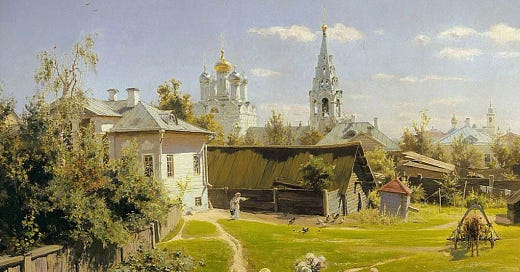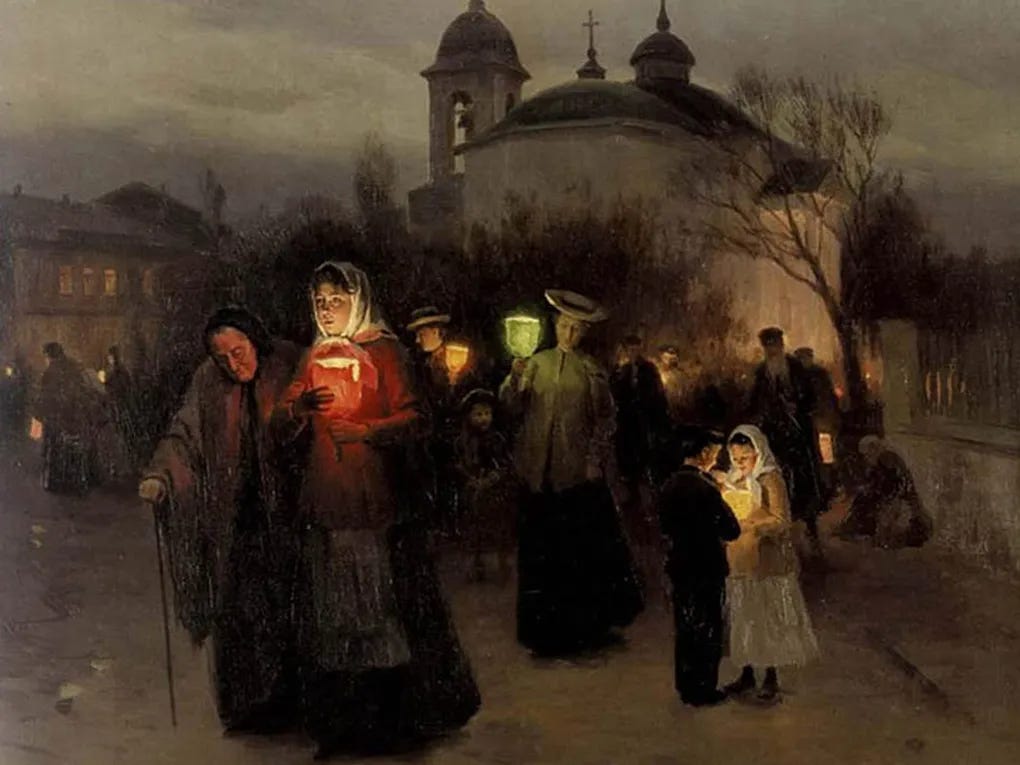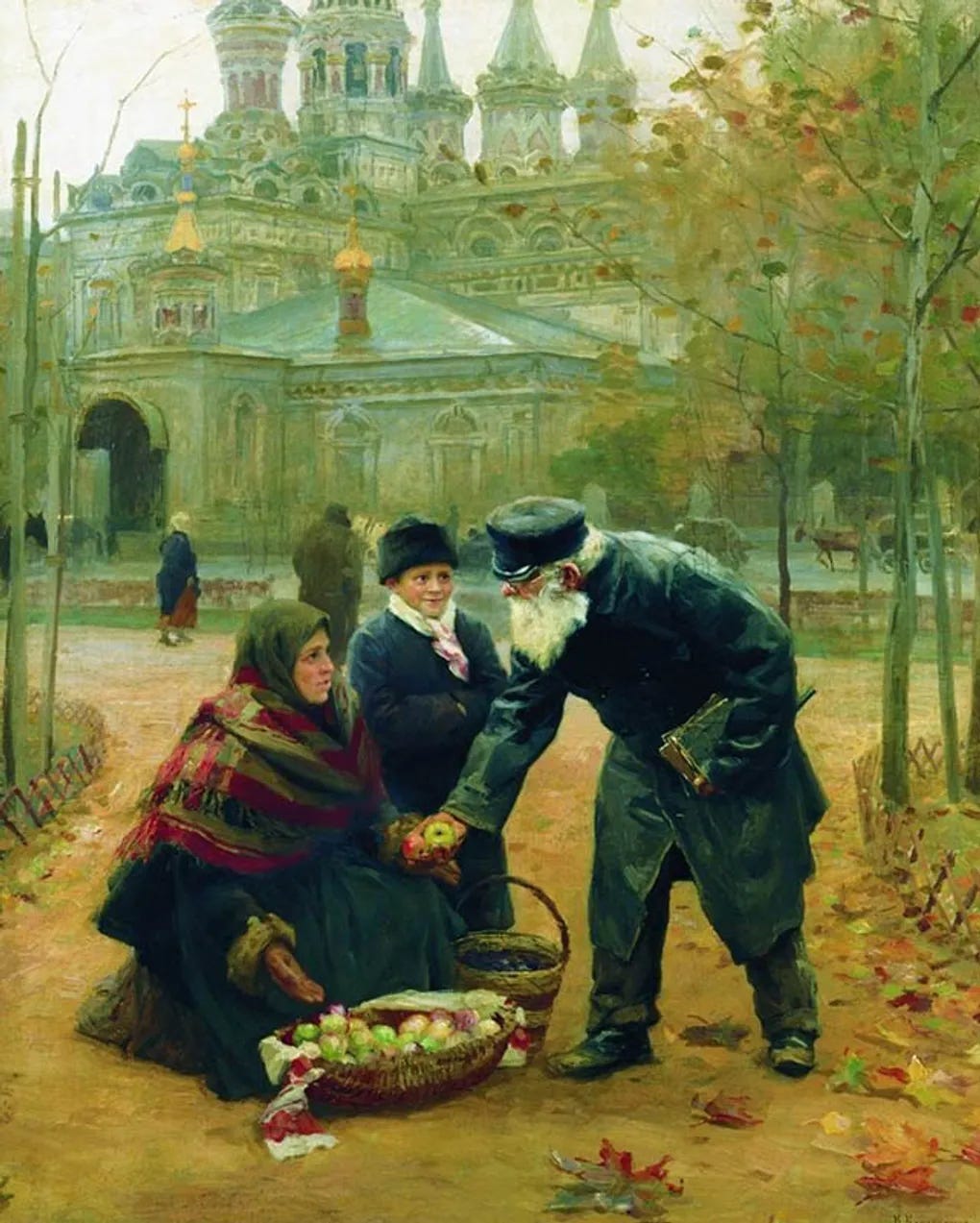“The summer of the Lord” by I.S. Shmelev *
I've finished reading of one most distinctive book about Russian culture
Доброго дня тебе, читатель.
Perhaps “Лето Господне”1 Ивана Шмелёва is the most important book in classical Russian literature of the XX century about child- and adulthood: we read about happiness and joy of a child and how one experiences loss and grief of the closest ever person — his father.
The idea of creating the autobiographical novel appeared thanks to his wife’s little nephew. Uncle Vanya, a loving uncle to his dear godson, рассказывал о своём детстве, о доме, об отце, о России и её обычаях2, а также о повседневной жизни замоскворецкой купеческой [= merchant] семьи, наполненной праздниками, радостями, скорбями3.
Чтобы понять, что видит и переживает4 маленький Ваня, нужно знать некоторые вещи (which we, citizens of a modern country, do not know nor appreciate because history and traditions were vastly changed due to the USSR policy), что “ефимонами” на Руси in a common parlance were called the Canon of Andrew of Crete which reads during the first 4 days in first week of the Great Feast.
Несмотря на то, что во время стояния5 маленький Ваня то и дело6 вспоминает о блинах, предстоящем7 ужине и баранках, в его память врезаются8 некоторые фразы из канона:
«Я слушаю страшные слова: — «увы, окаянная моя душе», «конец приближается», «скверная моя, окаянная моя… душе-блудница… во тьме оставим я, окаянного!..» А на словах «душе моя, душе моя, возстани, что спиши, конец приближается…»9 ему становится очень страшно — и успокаивается Ваня, лишь увидев10 рядом отца.
В этот момент в его голове вдруг возникает ключевая мысль11: «Умрёт и он!»12. «Кто-то сзади треплет меня по щеке13. Я знаю кто. Прижимаюсь спиной14, и мне ничего не страшно», — думает Ваня. Так мы видим глубину любви15 Вани к отцу, в котором он видит опору и защиту [= support&protection], источник устойчивости и стабильности.
The Apple Feast of the Saviour.16
Преображение Господне… Ласковый, тихий свет от него в душе — (1)доныне. Должно быть, от утреннего сада, от светлого голубого неба, от ворохов соломы, от (2)яблочков грушовки, хоронящихся в зелени, в которой уже желтеют отдельные листочки, — зелёно-золотистый, мягкий. Ясный, голубоватый день, не жарко, август. Подсолнухи уже переросли заборы и выглядывают на улицу, — не идёт ли уж крестный ход? Скоро их шапки срежут и понесут под пенье на золотых хоругвях. Первое яблочко, грушовка в нашем саду, — поспела, закраснелась. Будем её трясти — для завтра.
The Transfiguration of the Savior…. There’s a tender, gentle light in my soul from it (1)to this day. It should be, from the morning garden, from the bright blue sky, from the heaps of hay, from (2)the apples and pears17 preserved in the greenery, a few leaves of which are already withering—greenish-gold, and soft. A bright, light-bluish day, not hot; August. The sunflowers have already grown over the fences and peer at the street—is the procession going yet? Soon they will cut off the caps and take them while singing, under the golden banners. The first "grushovka" apple in our orchard is ripe and red. We will shake the tree—for tomorrow. \
If you want to support my project, you can do it here financially.
It’s just one cup of good herbal tea.
The ending of the novel can be called as the most penetrating in the Russian literature. Children cry, whicked hearts are softened, and prayers and singing uplift one’s soul and isntill hope.
As I mentioned in the beginning of the letter, the novel is about Shmelev’s childhood. What we learn reading it is how soul turns to faith, a history of Orthodox Russian Church, a country left by the author but not forgotten and devastated by the Bolsheviks but spiritually untouched.
I dearly recommend you to find this book as it’s been translated into many languages.
Как всегда, благодарю, что читаешь письма.
Береги себя!
“Лето” doesn’t mean “summer” here. Actually it is a meronymy of “year”. The book contains stories happening during a year. It was published in exile in France; initially Shmelev greeted the February Revolution with enthusiasm, later he disappointed in the leaders of the Revolution and their ideas.
a custom, tradition, or practice
sorrow, grief
experiences
Throughout the service in church, we stand (still optional, because there are benches) unlike in Catholic Church. Sure thing, if you have backpain and you’re young, it’s okay to sit.
every now and then
upcoming
<phrases> sink into the mind
That’s a good example of Russian Church language. «окаянная моя душе» — my cursed soul; «конец приближается» — the end is coming; «скверная моя, окаянная моя… душе-блудница… во тьме оставим я, окаянного!..» — my ugly, my cursed…prodigal soul… I stay in the dark, cursed…; «душе моя, душе моя, возстани, что спиши, конец приближается…» — my soul, my soul, arise, why you sleep, the end is coming…
just after seeing
a key idea occurs
He will die, too!
Someone stands behind me stroking my cheek.
<I> lean against
We see the depth of Ivan’s love for his father…
The translation isn’t accurate. We have such a type of apples that are small and watery with a mild taste of sweetness just like wild pears.






